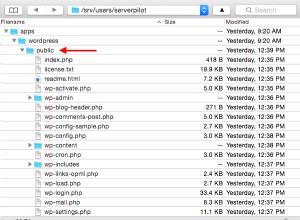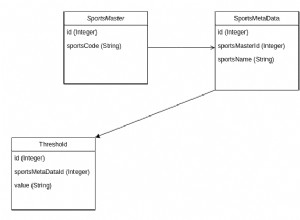Tak więc, po około dwóch tygodniach grzebania i braku gotowego rozwiązania, wymyśliłem własne.
Oto ConflictResolver klasa, która zapewnia managed_transaction dekorator funkcji. Możesz użyć dekoratora, aby oznaczyć funkcje, które mają być ponawiane. Tj. jeśli wystąpi błąd konfliktu bazy danych podczas uruchamiania funkcji, funkcja jest uruchamiana ponownie, teraz z większą nadzieją, że transakcja bazy danych, która spowodowała błąd konfliktu, zostałaby zakończona.
Kod źródłowy jest tutaj:https://bitbucket.org/miohtama/cryptoassets/src/529c50d74972ff90fe5b61dfbfc1428189cc248f/cryptoassets/core/tests/test_conflictresolver.py?at=master
Tylko Python 3.4+.
"""Serialized SQL transaction conflict resolution as a function decorator."""
import warnings
import logging
from collections import Counter
from sqlalchemy.orm.exc import ConcurrentModificationError
from sqlalchemy.exc import OperationalError
UNSUPPORTED_DATABASE = "Seems like we might know how to support serializable transactions for this database. We don't know or it is untested. Thus, the reliability of the service may suffer. See transaction documentation for the details."
#: Tuples of (Exception class, test function). Behavior copied from _retryable_errors definitions copied from zope.sqlalchemy
DATABASE_COFLICT_ERRORS = []
try:
import psycopg2.extensions
except ImportError:
pass
else:
DATABASE_COFLICT_ERRORS.append((psycopg2.extensions.TransactionRollbackError, None))
# ORA-08177: can't serialize access for this transaction
try:
import cx_Oracle
except ImportError:
pass
else:
DATABASE_COFLICT_ERRORS.append((cx_Oracle.DatabaseError, lambda e: e.args[0].code == 8177))
if not DATABASE_COFLICT_ERRORS:
# TODO: Do this when cryptoassets app engine is configured
warnings.warn(UNSUPPORTED_DATABASE, UserWarning, stacklevel=2)
#: XXX: We need to confirm is this the right way for MySQL, SQLIte?
DATABASE_COFLICT_ERRORS.append((ConcurrentModificationError, None))
logger = logging.getLogger(__name__)
class CannotResolveDatabaseConflict(Exception):
"""The managed_transaction decorator has given up trying to resolve the conflict.
We have exceeded the threshold for database conflicts. Probably long-running transactions or overload are blocking our rows in the database, so that this transaction would never succeed in error free manner. Thus, we need to tell our service user that unfortunately this time you cannot do your thing.
"""
class ConflictResolver:
def __init__(self, session_factory, retries):
"""
:param session_factory: `callback()` which will give us a new SQLAlchemy session object for each transaction and retry
:param retries: The number of attempst we try to re-run the transaction in the case of transaction conflict.
"""
self.retries = retries
self.session_factory = session_factory
# Simple beancounting diagnostics how well we are doing
self.stats = Counter(success=0, retries=0, errors=0, unresolved=0)
@classmethod
def is_retryable_exception(self, e):
"""Does the exception look like a database conflict error?
Check for database driver specific cases.
:param e: Python Exception instance
"""
if not isinstance(e, OperationalError):
# Not an SQLAlchemy exception
return False
# The exception SQLAlchemy wrapped
orig = e.orig
for err, func in DATABASE_COFLICT_ERRORS:
# EXception type matches, now compare its values
if isinstance(orig, err):
if func:
return func(e)
else:
return True
return False
def managed_transaction(self, func):
"""SQL Seralized transaction isolation-level conflict resolution.
When SQL transaction isolation level is its highest level (Serializable), the SQL database itself cannot alone resolve conflicting concurrenct transactions. Thus, the SQL driver raises an exception to signal this condition.
``managed_transaction`` decorator will retry to run everyhing inside the function
Usage::
# Create new session for SQLAlchemy engine
def create_session():
Session = sessionmaker()
Session.configure(bind=engine)
return Session()
conflict_resolver = ConflictResolver(create_session, retries=3)
# Create a decorated function which can try to re-run itself in the case of conflict
@conflict_resolver.managed_transaction
def myfunc(session):
# Both threads modify the same wallet simultaneously
w = session.query(BitcoinWallet).get(1)
w.balance += 1
# Execute the conflict sensitive code inside a managed transaction
myfunc()
The rules:
- You must not swallow all exceptions within ``managed_transactions``. Example how to handle exceptions::
# Create a decorated function which can try to re-run itself in the case of conflict
@conflict_resolver.managed_transaction
def myfunc(session):
try:
my_code()
except Exception as e:
if ConflictResolver.is_retryable_exception(e):
# This must be passed to the function decorator, so it can attempt retry
raise
# Otherwise the exception is all yours
- Use read-only database sessions if you know you do not need to modify the database and you need weaker transaction guarantees e.g. for displaying the total balance.
- Never do external actions, like sending emails, inside ``managed_transaction``. If the database transaction is replayed, the code is run twice and you end up sending the same email twice.
- Managed transaction section should be as small and fast as possible
- Avoid long-running transactions by splitting up big transaction to smaller worker batches
This implementation heavily draws inspiration from the following sources
- https://stackoverflow.com/q/27351433/315168
- https://gist.github.com/khayrov/6291557
"""
def decorated_func():
# Read attemps from app configuration
attempts = self.retries
while attempts >= 0:
session = self.session_factory()
try:
result = func(session)
session.commit()
self.stats["success"] += 1
return result
except Exception as e:
if self.is_retryable_exception(e):
session.close()
self.stats["retries"] += 1
attempts -= 1
if attempts < 0:
self.stats["unresolved"] += 1
raise CannotResolveDatabaseConflict("Could not replay the transaction {} even after {} attempts".format(func, self.retries)) from e
continue
else:
session.rollback()
self.stats["errors"] += 1
# All other exceptions should fall through
raise
return decorated_func




